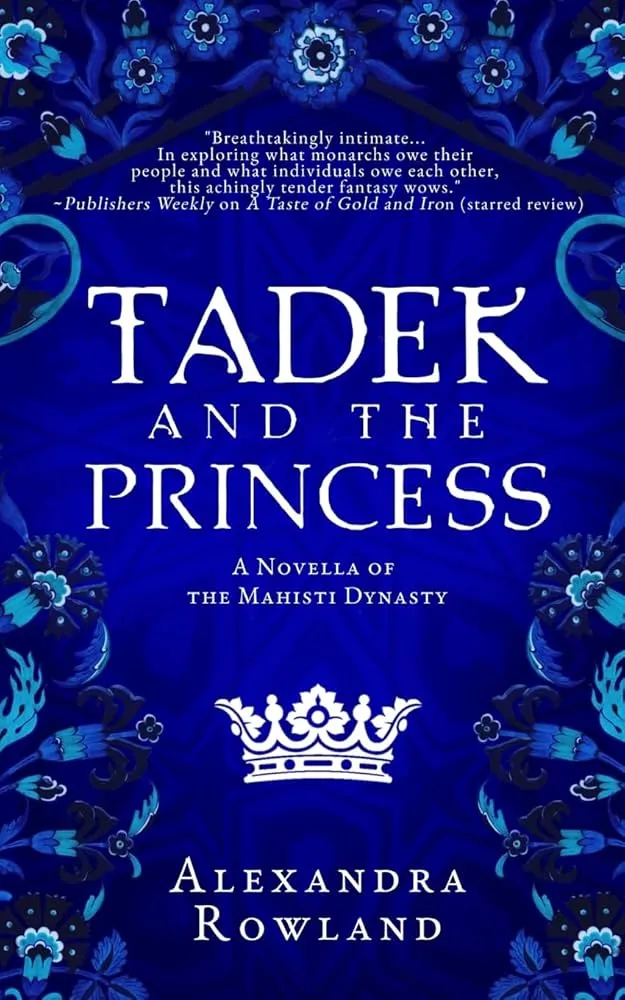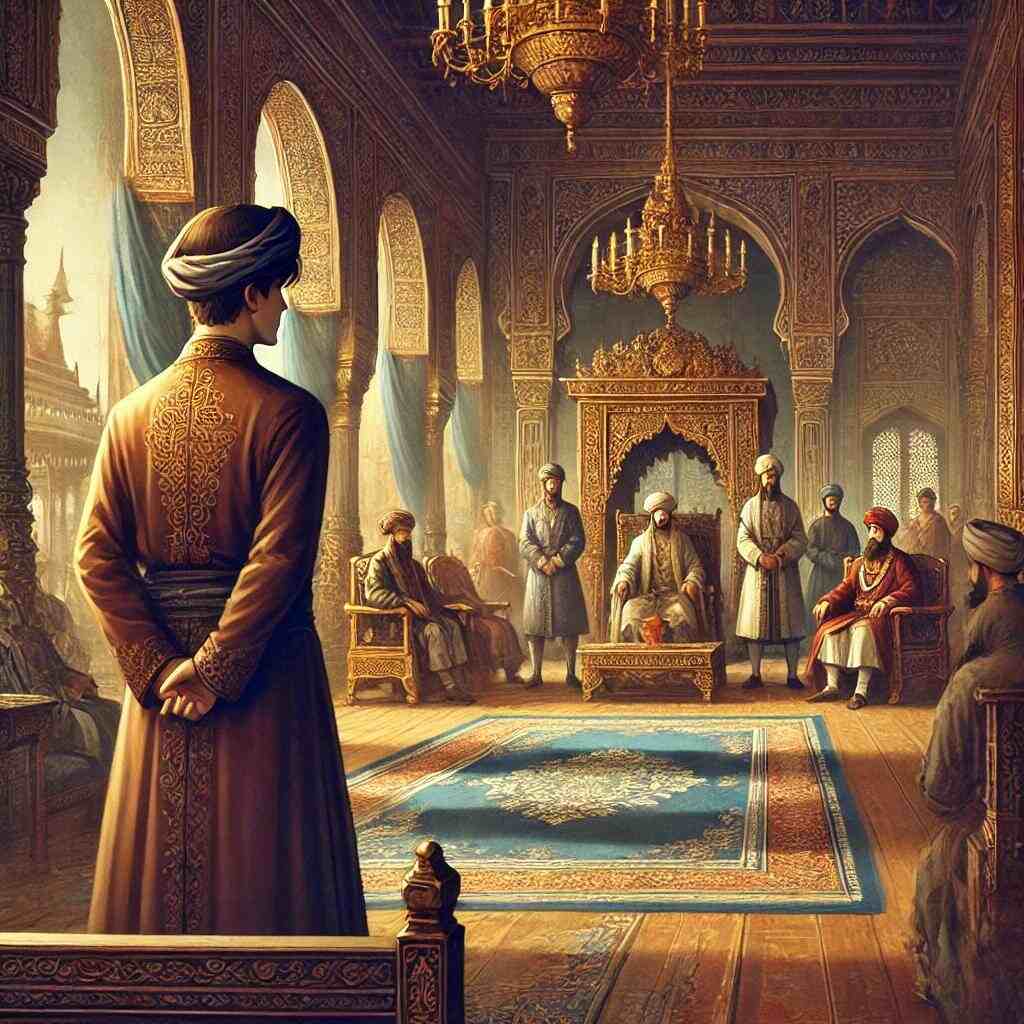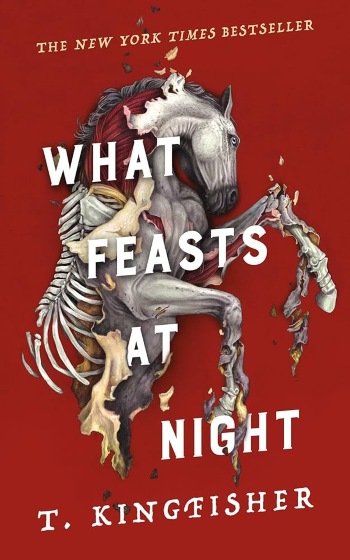Tadek and the Princess, Alexandra Rowland
This review emphasizes the emotional depth and court intrigue in Tadek and the Princess. Rowland creates a world where loyalty and identity are constantly tested, leaving readers both captivated and reflective.
Alexandra Rowland’s Tadek and the Princess is a compelling story that blends court intrigue with themes of personal growth, loyalty, and self-discovery. Set in the Mahisti Dynasty, the novella follows the protagonist, Tadek, who navigates the complexities of life as a servant to a royal family. His interactions with Princess Mihrişah and Prince Kadou reveal both the emotional depth of his character and the political web in which he finds himself entangled. This Tadek and the Princess review breaks down key aspects of the fantasy novella, touching on its character development, world-building, and major themes.

Tadek’s World of Loyalty and Survival
The novella opens by immersing readers in Tadek’s dual role as servant and key player in the royal household. The novel provides deep insight into Tadek’s inner struggles, showing his fierce loyalty to Princess Mihrişah. His strong sense of duty toward the royal family is evident throughout the story. Tadek’s memories of the late princess guide his decisions, emphasizing the deep connection he feels to her legacy.
Major Themes Explored:
- Loyalty: Tadek’s dedication to the princess and the royal family drives much of the plot.
- Self-discovery: His journey to understand his place in the court is central to the story.
- Survival: Tadek’s upbringing shapes his instinct for survival, both emotionally and physically.
This book review highlights how Rowland masterfully intertwines these themes, making the protagonist relatable and complex.

Relationships and Power Dynamics
The relationships Tadek forms with the royal family reveal the hierarchical power structures that define the court. His bond with Prince Kadou, in particular, shows the vulnerability of both characters as they navigate political roles. Tadek’s loyalty seems unwavering, but the shifting power dynamics around him create internal conflict. He struggles to find his place in the royal household as these dynamics change.
One particularly striking moment occurs when Tadek encounters a long-lost portrait of the late Princess Mihrişah. His reaction to the portrait is a powerful emotional moment, revealing the depths of his love and grief:
“He stood before her, too wary of his own emotions to let himself feel anything at all except a quivering tightness in his lungs.“
This moment highlights how Tadek’s emotions drive much of his decision-making, allowing readers to see beyond his public loyalty and into his private sorrow.
Court Intrigue and Political Maneuvering
At the heart of the novella lies the tension of court politics and intrigue. Tadek’s relationships with other servants, royals, and figures of power pull him in different directions, often forcing him to choose between loyalty to the crown and his own personal growth. Rowland crafts a world where power is fragile, and every action has the potential to ripple through the court.
As the Tadek and the Princess review notes, the intricacies of court life are a defining feature of the story. From Tadek’s observations of political dealings to his personal entanglements, Alexandra Rowland keeps readers engaged in the suspenseful atmosphere. The novella emphasizes that survival in the court requires more than just loyalty; it requires strategy, alliances, and, at times, deception.

The Emotional and Political Legacy of the Late Princess
Princess Mihrişah’s presence lingers throughout the narrative, even after her death. Her influence shapes not only Tadek’s emotional landscape but also the political atmosphere of the court. The princess’s legacy is central to Tadek’s character, and his memories of her create a nuanced tension between his loyalty to her and his evolving relationship with her son, Prince Kadou.
Key Takeaways About the Princess’s Legacy:
- Her portraits serve as a reminder of her power and influence.
- Tadek’s memories of her guide his moral compass throughout the story.
- The court still navigates the aftermath of her death, both emotionally and politically.
This Tadek and the Princess review points out that the emotional weight of the late princess acts as a cornerstone for Tadek’s actions and motivations.
The Importance of Identity and Belonging
As the fantasy novella progresses, Tadek grapples with questions of identity, not just in relation to his role as a servant but also in terms of his personal desires. His growing closeness to Prince Kadou adds layers to his character as he balances duty and personal longing. The novella delicately explores Tadek’s internal struggles with belonging, making his character arc one of profound self-exploration.
Rowland’s attention to these themes creates a powerful narrative that resonates on both an emotional and political level. Tadek and the Princess examines the cost of loyalty and the search for identity in a world that often demands more than one can give.







